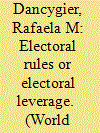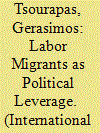|
|
|
Sort Order |
|
|
|
Items / Page
|
|
|
|
|
|
|
| Srl | Item |
| 1 |
ID:
129989


|
|
|
|
|
| Publication |
2014.
|
| Summary/Abstract |
Immigration has fundamentally altered the ethnic and religious makeup of most advanced democracies, but substantial variation is observed in the political representation of immigrant-origin minority groups across countries and cities. Though existing research has highlighted the role of electoral institutions in explaining minority representation, it is often difficult to isolate their effects across contexts. Focusing on Muslims in England and employing a new data set containing over 42,000 candidate-level observations, this article explains Muslim candidate election and selection. To do this, the author makes use of a rule change whereby a subset of localities switched from the use of multimember elections to the use of single-member elections. She finds that these electoral rules have no significant effect on the share of Muslims that gets elected but that they do influence the selection process: in a given election, Muslims are half as likely to be selected when only one seat is up for election as compared with when three seats are in play. Yet parties balance the slate across consecutive single-member elections, leading to similar results across systems. Further, the more undesirable the seat, the more likely it is to have a Muslim on the ticket, but this effect holds only in single-member elections, and it reverses as Muslims gain electoral leverage. Overall electoral leverage proves crucial: the effect of institutions and the potential for institution-based discrimination are conditional on the size and concentration of the local Muslim population and the votes it can deliver at both the election and the selection stages.
|
|
|
|
|
|
|
|
|
|
|
|
|
|
|
|
| 2 |
ID:
133116


|
|
|
|
|
| Publication |
2014.
|
| Summary/Abstract |
This paper draws from research on small-scale maize production in Mexico's Central Highland region to discuss the geopolitical implications of everyday agricultural practices. An overwhelming majority of maize farmers in this region, as well as in the country more broadly, continue to cultivate locally adapted maize varieties they have bred themselves - criollo maize is the vernacular term - despite decades of concerted government attempts to effect the widespread adoption of commercially bred and licensed hybrid varieties. This state effort to restructure agricultural systems and food security according to nationalist and capitalist priorities is one tactic in a long and violent struggle for control over peasant land and labour in Mexico. By integrating feminist scholarship in geopolitics and in political ecology, I am following the lead of geographers who regard the materialities of everyday life as a foundation for political tensions and conflicts that are constantly unfolding along intersecting lines of difference. Though geopolitics has rarely turned its attention directly to theories of intimate socio-ecological relations, I argue that the field has much analytical and political leverage to gain by engaging with political ecology, and that feminist geographic imaginaries provide a crucial space in which to do so. This approach allows for an analysis of how a dominant geopolitics of land and agriculture is being undermined through the routine production of criollo maize, revealing new potential for creating broad political alliances with social movements that are currently working toward alternative visions of agriculture and food security.
|
|
|
|
|
|
|
|
|
|
|
|
|
|
|
|
| 3 |
ID:
160576


|
|
|
|
|
| Summary/Abstract |
How do states attempt to use their position as destinations for labor migration to influence sending states, and under what conditions do they succeed? I argue that economically driven cross-border mobility generates reciprocal political economy effects on sending and host states. That is, it produces migration interdependence. Host states may leverage their position against a sending state by either deploying strategies of restriction—curbing remittances, strengthening immigration controls, or both—or displacement—forcefully expelling citizens of the sending state. These strategies’ success depends on whether the sending state is vulnerable to the political economy costs incurred by host states’ strategy, namely if it is unable to absorb them domestically and cannot procure the support of alternative host states. I also contend that displacement strategies involve higher costs than restriction efforts and are therefore more likely to succeed. I demonstrate my claims through a least-likely, two-case study design of Libyan and Jordanian coercive migration diplomacy against Egypt in the aftermath of the Arab Spring. I examine how two weaker Arab states leveraged their position against Egypt, a stronger state but one vulnerable to migration interdependence, through the restriction and displacement of Egyptian migrants.
|
|
|
|
|
|
|
|
|
|
|
|
|
|
|
|
|
|
|
|
|